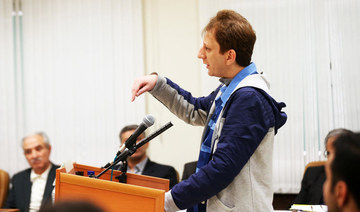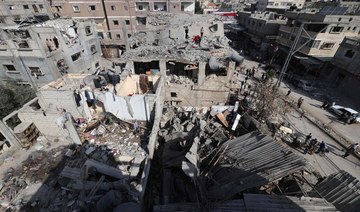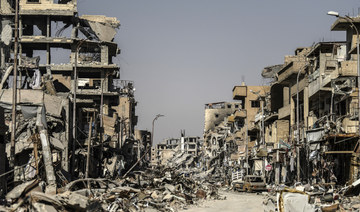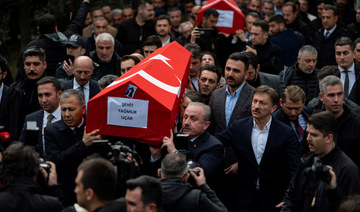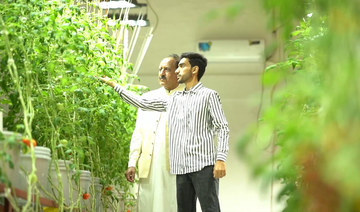WASHINGTON: Despite dire US warnings and fears of a humanitarian disaster, the Trump administration has little leverage to stop Russia, Iran and Syria pressing ahead with a massive military assault against Syria’s northwest Idlib province.
Washington has threatened military action in case of a chemical weapons attack but its mixed messaging on retaining a US presence in Syria and a cut in aid has diminished its already limited influence over the seven-year conflict.
So the administration, which has criticized former President Barack Obama for his inaction on Syria after the war started in 2011, risks appearing powerless to prevent the three nations’ plan to retake Syria’s last rebel-held area. It’s an operation that many warn will cause major bloodshed among a vulnerable population of 3 million people.
And on Saturday, Syrian government and Russian warplanes targeted the province’s southern edge in what activists described as the most intense airstrikes in weeks. More than 60 air raids killed at least four civilians in southern Idlib, according to the Syrian Observatory for Human Rights and rescue workers.
While the new US special envoy for Syria said this week that America will stay in Syria until the complete eradication of the Daesh group, there’s little assurance that President Donald Trump won’t again seek the withdrawal of the roughly 2,000 US troops in the country. And in a sign of the administration’s shrinking commitment to Syria, it has pulled more than $200 million in stabilization funding for liberated areas, telling other nations they should step up to pay.
A summit in Tehran on Friday between Russian President Vladimir Putin, Iranian President Hassan Rouhani and Turkish President Recep Tayyip Erdogan was seen as a chance for a diplomatic solution before a full-scale assault on Idlib. The three nations are all tacitly allied against IS and in support of a unified, stable Syria, but have differing views of how to achieve those ends.
After Friday’s talks, the UN envoy for Syria told the UN Security Council there were indications that the three leaders intend to continue talking to avoid a catastrophe. But above all, the summit highlighted the stark differences among these allies of convenience, with Putin and Rouhani opposing Erdogan’s call for a cease-fire.
As they discussed the fate of Idlib, US Ambassador to the United Nations Nikki Haley was talking tough in New York, telling the Security Council that the United States would consider any assault on the province as a “dangerous escalation” of the conflict that has already claimed more than 400,000 lives and forced more than 5 million Syrians to flee the country.
“If (Syrian President Bashar) Assad, Russia, and Iran continue, the consequences will be dire,” said Haley, who was chairing the council meeting. “The Assad regime must halt its offensive ... Russia and Iran, as countries with influence over the regime, must stop this catastrophe. It is in their power to do so.”
Those remarks capped a week of rising US rhetoric opposing the Idlib operation.
On Monday, Trump tweeted: “President Bashar Assad of Syria must not recklessly attack Idlib Province. The Russians and Iranians would be making a grave humanitarian mistake to take part in this potential human tragedy. Hundreds of thousands of people could be killed. Don’t let that happen!“
A day later, Secretary of State Mike Pompeo expanded on the tweet, and renewed calls for the conflict to be resolved through the UN-led Geneva Process, which has been stalled for years. And on Thursday, the man Pompeo chose to be his point-man on getting the Geneva process back on track, veteran diplomat James Jeffrey, reiterated Trump’s message, saying the US would use all the “tools” it has to respond to a chemical attack.
Another “tool” in the US arsenal is economic pressure. The US Treasury Department slapped sanctions on nine people and companies for assisting weapons or fuel transfers to the Assad regime on Thursday. But sanctions have been ineffectual since they first began to be applied during the Obama administration.
Even American airstrikes launched against the Assad government have had limited impact in the past.
Twice before the US has resorted to missile strikes in response to chemical weapons attacks, only to see them used again. As Syrian forces prepare for the assault on Idlib, US and UN officials again see signs that those internationally prescribed weapons are being readied for the battlefield.
“There’s lots of evidence that chemical weapons are being prepared,” Jeffrey told reporters Thursday.
Officials and analysts will be watching Idlib closely over the next week ahead of UN-led talks on Syria in Geneva on Sept. 14.
“The Trump administration is really at a Hail Mary moment,” said Nicholas Heras, a Syria analyst and fellow at the Center for New American Security. Idlib is the last opportunity for the US to increase leverage in Syria, he said, and if the province falls before the Geneva talks, Trump administration efforts to re-engage with peace talks will likely fail.
Heras warned that the Trump team is late to formulate a coherent Syria policy.
“It’s like trying to save the house as it’s burning down,” he said.
US lacks leverage as assault on Syrian enclave looms
US lacks leverage as assault on Syrian enclave looms
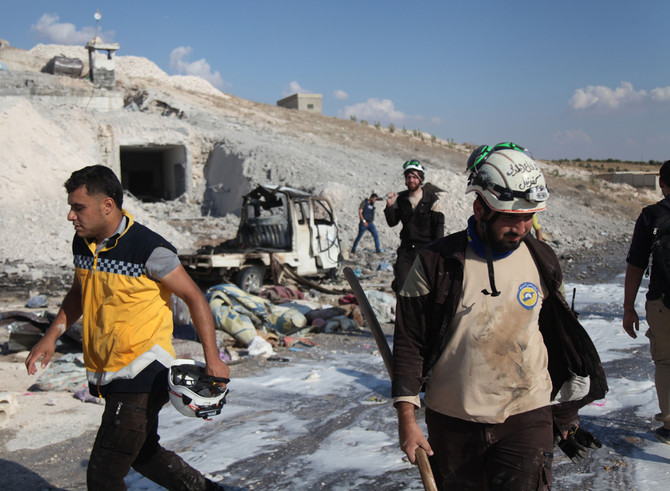
- Syrian government and Russian warplanes targeted the province’s southern edge
- US officials have cautioned Syrian President Bashar Assad against "recklessly attacking" Idlib
Iran slaps sanctions on US, UK over Israel support
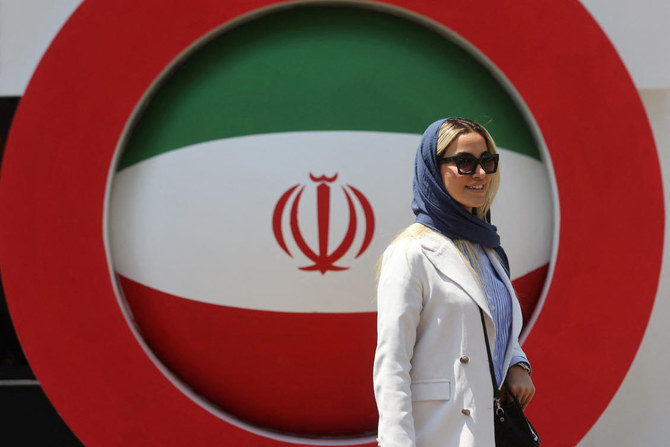
- Sanctions targeted seven Americans
- British officials and entities targeted include Secretary of State for Defense Grant Shapps
TEHRAN: Iran announced on Thursday sanctions on several American and British individuals and entities for supporting Israel in its war against the Palestinian militant group Hamas.
The Islamic republic, the regional arch-foe of Israel, unveiled the punitive measures in a statement from its foreign ministry.
It said the sanctions targeted seven Americans, including General Bryan P. Fenton, commander of the US special operations command, and Vice Admiral Brad Cooper, a former commander of the US Navy’s Fifth Fleet.
British officials and entities targeted include Secretary of State for Defense Grant Shapps, commander of the British army strategic command James Hockenhull and the UK Royal Navy in the Red Sea.
Penalties were also announced against US firms Lockheed Martin and Chevron and British counterparts Elbit Systems, Parker Meggitt and Rafael UK.
The ministry said the sanctions include “blocking of accounts and transactions in the Iranian financial and banking systems, blocking of assets within the jurisdiction of the Islamic Republic of Iran as well as prohibition of visa issuance and entry to the Iranian territory.”
The impact of these measures on the individuals or entities, as well as their assets or dealings with Iran, remains unclear.
The war in the Gaza Strip erupted after the October 7 attack by Palestinian militants on Israel which killed 1,170 people, mostly civilians, according an AFP tally based on official Israeli figures.
Iran backs Hamas but has denied any direct involvement in the attack.
Israel’s retaliatory offensive against Hamas has since killed at least 34,568 people in Gaza, mostly women and children, according to the Hamas-run territory’s health ministry.
12-truck UAE aid convoy enters Gaza Strip
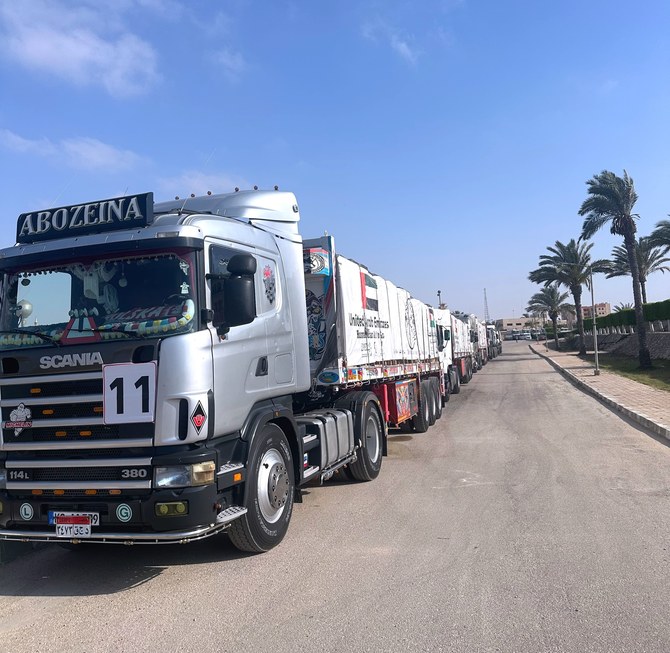
- UAE has also sent Palestinians food, water via sea, air
- Emirates has provided medical treatment for thousands
Al-ARISH: A UAE aid convoy entered the Gaza Strip on Wednesday via Egypt’s Rafah Crossing Point as a part of the country’s “Operation Chivalrous Knight 3” project to support the Palestinian people, UAE state news agency WAM reported on Thursday.
The 12-truck convoy is transporting over 264 tonnes of humanitarian aid including food, water and dates.
The latest convoy now brings to 440 the number of trucks that have been used for support efforts.
As of May 1, 2024, the UAE has now provided the Palestinians 22,436 tonnes of aid, which has included the deployment of 220 cargo planes and three cargo ships. The goods pass through Al-Arish Port and the Rafah crossing into Gaza.
These efforts are a part of the “Birds of Goodness” operation, which involves aerial drops of humanitarian supplies. By Wednesday, 43 drops have been conducted, delivering a total of 3,000 tonnes of food and relief materials to inaccessible and isolated areas in Gaza.
Since its establishment, medical staffers at the UAE’s field hospital in Gaza have treated more than 18,970 patients. An additional 152 patients were evacuated to the UAE’s Floating Hospital in Al-Arish Port, and 166 to the UAE for treatment.
The UAE has set up six desalination plants with a production capacity of 1.2 million gallons per day to support the people in Gaza.
Syrians accuse Russia of hitting hospital in new complaint filed with UN rights committee

- Moscow has repeatedly denied accusations that it violated international law in Syria
BEIRUT: A Syrian man and an aid organization have accused Russia of violating international law by deliberately bombing a hospital in northern Syria in 2019, in a new complaint filed at the United Nations Human Rights Committee this week.
Russia, which intervened militarily in Syria’s conflict in 2015 to bolster the forces of its ally President Bashar Assad, has been accused by UN investigators of committing war crimes in Syria, but has not faced any international tribunal.
Moscow has repeatedly denied accusations that it violated international law in Syria.
The new complaint, filed on May 1 but made public on Thursday, accuses Russia’s Air Force of killing two civilians in a series of air strikes on the Kafr Nobol Surgical Hospital in the northwest province of Idlib on May 5, 2019.
It was brought to the committee by the cousin of those killed and by Hand in Hand for Aid and Development, an aid group that was supporting the hospital, which was in territory held by armed groups opposed to Assad.
The complaint relies on videos, eyewitness statements and audio recordings, including correspondence between a Russian pilot and ground control about dropping munitions.
“Syrians are looking to the Human Rights Committee to show us some measure of redress by acknowledging the truth of this brutal attack, and the suffering caused,” said Fadi Al-Dairi, the director of Hand in Hand.
The Geneva-based Human Rights Committee is a body of independent experts that monitors the status of political and civil rights around the world, and can receive complaints by states and individuals on alleged violations.
Individual complaints can lead to compensation payments, investigations or other measures.
While rights groups have accused both Syria and Russia of violating international law within Syria for years, neither country is party to the International Criminal Court’s Rome Statute, and opportunities for accountability are rare.
Russia signed onto the Optional Protocol to the International Covenant on Civil and Political Rights in 1991, meaning it accepts the Human Rights Committee’s ability to consider complaints from individuals against it.
“This complaint before a preeminent international human rights tribunal exposes the Russian government and armed forces’ deliberate strategy of targeting health care in clear violation of the laws of war,” said James A. Goldston, executive director of the Justice Initiative, whose lawyers are representing the applicants.
In 2019, the UN Human Rights Commission — a separate body — said strikes on medical facilities in Syria including the Kafr Nobol hospital “strongly” suggested that “government-affiliated forces conducting these strikes are, at least partly, if not wholly, deliberately striking health facilities.”
Morocco’s farming revolution: defying drought with science
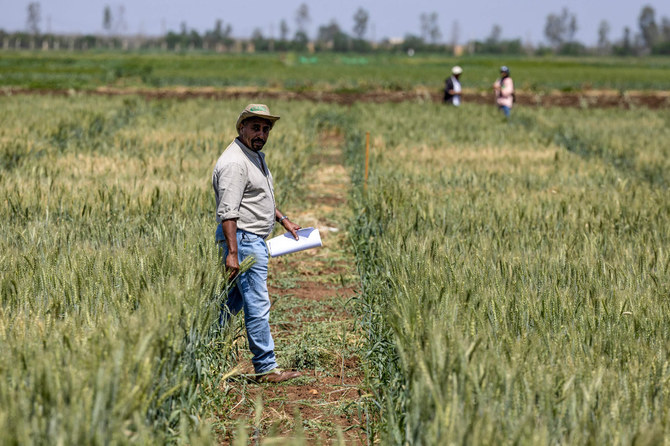
- In the face of “extremely high” water stress, Morocco's cultivated areas are expected to shrink to 2.5 million hectares drastically
- The kingdom's agricultural research agency aims to develop genotypes that not only withstand drought and heat but also yield abundantly
MARCHOUCH, Morocco: In the heart of sun-soaked Morocco, scientists are cultivating a future where tough crops defy a relentless drought, now in its sixth year.
“Look at these beautiful ears of wheat,” said Wuletaw Tadesse Degu, the head of wheat breeding at the International Center for Agricultural Research in Dry Areas (ICARDA).
“The difference in quality between our field and others is striking,” he said, pointing toward a lush expanse in Marchouch, south of Rabat, that stood in stark contrast with the barren lands elsewhere.
By 2040, Morocco is poised to face “extremely high” water stress, a dire prediction from the World Resources Institute, a non-profit research organization.
Figures from the North African country’s central bank paint a grim picture.
Cultivated areas across the kingdom are expected to shrink to 2.5 million hectares in 2024 compared with 3.7 million last year, with cereal yields more than halving to 25 million quintals (2.5 million tons) over the same period.
“It has become essential to use resilient seeds and to employ them as quickly as possible,” said Tadesse, whose center recently inaugurated a plant gene bank.

Tadesse’s mission is to develop genotypes that not only withstand drought and heat but also yield abundantly.
Last year, while the nation struggled, Marchouch achieved a yield of four tons per hectare with just 200 millimeters of rainfall.
Controlled irrigation and strategic sowing techniques are behind this agricultural revolution.
Looking to maximize production, farmers are experimenting with planting times and judicious irrigation.
Even a scant 10 millimeters of water, carefully applied, transformed barren soil into thriving fields.
Barley, too, has seen a resurgence, with yields jumping from 1.5 to two tons per hectare last year, thanks to climate-smart genotypes, said Miguel Sanchez Garcia, a barley specialist at ICARDA.
The center, which operates in 17 countries in Africa and Asia, says it has developed 30 “elite lines” of grain.
Most of them are produced in Morocco by breeding genotypes of wild wheat with different ancestors, said ICARDA genetics researcher Ahmed Amri.

Moroccan agricultural authorities approved six new wheat and barley varieties last year, but bureaucratic hurdles loom large.
Approval processes drag on, impeding the timely dissemination of new varieties to farmers, researchers at the center said, resulting in a five-year journey from approval to market-ready seeds.
“The certification system takes too long and should be revised quickly,” said Moha Ferrahi, head of genetic resources conservation and improvement at the National Institute of Agricultural Research.
Ferrahi also pointed to the lack of engagement from private companies and farmers who opt for “foreign seeds to have a quicker return on investment while these seeds are not adapted to the climate of Morocco.”
Yet many see room for improvement, even in a drought-hit country where the average citizen consumes about 200 kilogrammes of wheat per year — significantly above the world’s average, according to official figures.
“Unlike countries like Egypt or Ethiopia, Morocco has chosen to liberalize its market,” said researcher Amri, meaning that authorities have no control over what varieties farmers select.
But Amri remains convinced that, coupled with the national agricultural program, the widespread adoption of resilient varieties will help offset mounting losses.
Teenage Iranian protester Nika Shakarami ‘was killed by police’

JEDDAH: Iranian authorities ordered the arrest of activists and journalists on Wednesday after a leaked Revolutionary Guard report revealed that secret police had sexually assaulted and killed a teenage girl during Iran’s “hijab protests” in 2022.
Nika Shakarami, 16, died during demonstrations over the death in police custody of Mahsa Amini, who had been detained for wearing her headscarf incorrectly.
Shakarami’s death also sparked widespread outrage. Authorities said she died after falling from a tall building, but her mother said the girl had been beaten.
In a report prepared for the Islamic Revolutionary Guard Corps and leaked to the BBC, investigators said Shakarami had ben arrested by undercover security forces who molested her, then killed her with batons and electronic stun guns when she struggled against the attack.
Iran’s judiciary said on Wednesday that the BBC story was “a fake, incorrect and full-of-mistakes report,” without addressing any of the alleged errors.
“The Tehran Prosecutor’s Office filed a criminal case against these people,” a spokesman said, with charges including “spreading lies” and “propaganda against the system.” The first charge can carry up at a year and a half in prison and dozens of lashes, while the second can bring up to a year’s imprisonment.
It was not clear if prosecutors had charged the three BBC journalists who wrote the report. Those associated with the BBC’s Persian service have been targeted for years by Tehran and barred from working in the country since its disputed 2009 presidential election and Green Movement protests.
Iranian Interior Minister Ahmad Vahidi said the BBC report was an effort to “divert attention” from protests at American universities over the Israel-Hamas war. “The enemy and their media have resorted to false and far-fetched reports to conduct psychological operations,” he said.


